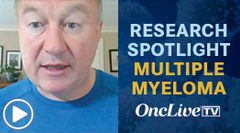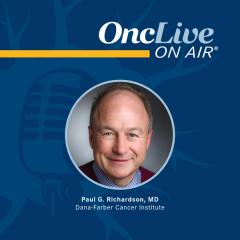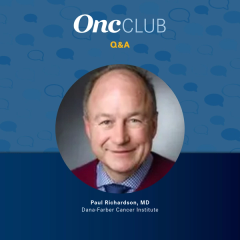
Dr Richardson on the Potential Significance of Mezigdomide in Relapsed/Refractory Multiple Myeloma

Paul G. Richardson, MD, discusses how the continued development of the novel agent mezigdomide could affect the treatment paradigm for patients who progressed on, and developed resistance to, other available BCMA-directed therapies.
Episodes in this series

Paul G. Richardson, MD, clinical program leader, director of Clinical Research, Jerome Lipper Multiple Myeloma Center, physician, Dana-Farber Cancer Institute, RJ Corman professor of Medicine, Harvard Medical School, discusses how the continued development of the novel agent mezigdomide (CC-92480) could affect the treatment paradigm for patients who progressed on, and developed resistance to, other available BCMA-directed therapies.
The potent, novel, oral CELMoD agent mezigdomide represents a promising development in the treatment of patients with multiple myeloma, Richardson begins. The therapeutic was designed to induce rapid protein degradation, thereby reducing proliferative activity in patients who are resistant to prior immunomodulatory agents such as lenalidomide (Revlimid) and pomalidomide (Pomalyst).
There is continued clinical interest in investigating the viability of administering this agent along with emerging BCMA platforms, especially cellular therapies, Richardson states. Plans are underway to conduct trials combining mezigdomide with T-cell redirecting therapy, leveraging the synergistic potential of these approaches, Richardson notes. Additionally, mezigdomide has the potential to serve as an alternative treatment option for patients whose disease has progressed post-CAR T-cell therapy, Richardson speculates.
Notably, mezigdomide has shown activity in combination with elotuzumab (Empliciti, indicating its interaction with natural killer cells, Richardson says. In cases where CAR T-cell therapy is unsuccessful, natural killer cells may represent a valuable alternative mechanism through which mezigdomide could potentiallyenhance immune responses, Richardson explains.
Notably, Richardson states that there will be further exploration into the novel agent led by the Dana-Farber Cancer Institute which will explore the efficacy of mezigdomide as both a monotherapy and in combination with agents such as iberdomide (CC 220) and elotuzumab (NCT02773030). This endeavor aims to translate promising laboratory findings into safe and effective clinical strategies, Richardson says. Many patients are more susceptible to developing cytopenia and infection after completing treatment with CAR T-cell therapy, and therapeutic approaches should be designed to account for this increased risk, he adds.
With the emergence of new targets for drug development, such as GPRC5D and FcRH5, the multiple myeloma treatment landscape is rapidly expanding, Richardson continues. Mezigdomide's versatility as an oral therapeutic positionsit to serve as an effective option for patients if other BCMA-targeted therapies prove ineffective, he says. Its potential to address myeloma from multiple angles underscores its significance in the evolving treatment paradigm, Richardson concludes.










































